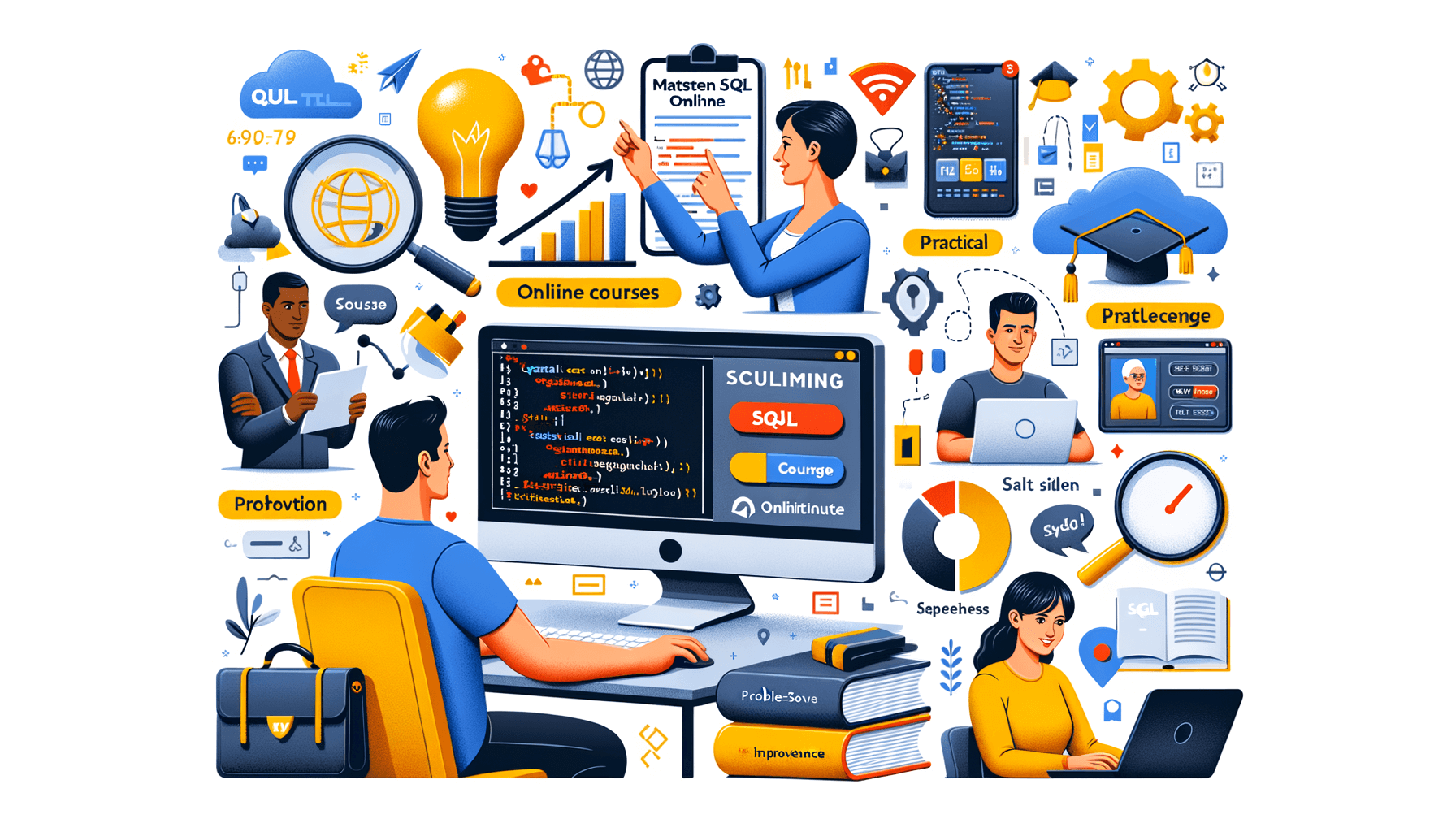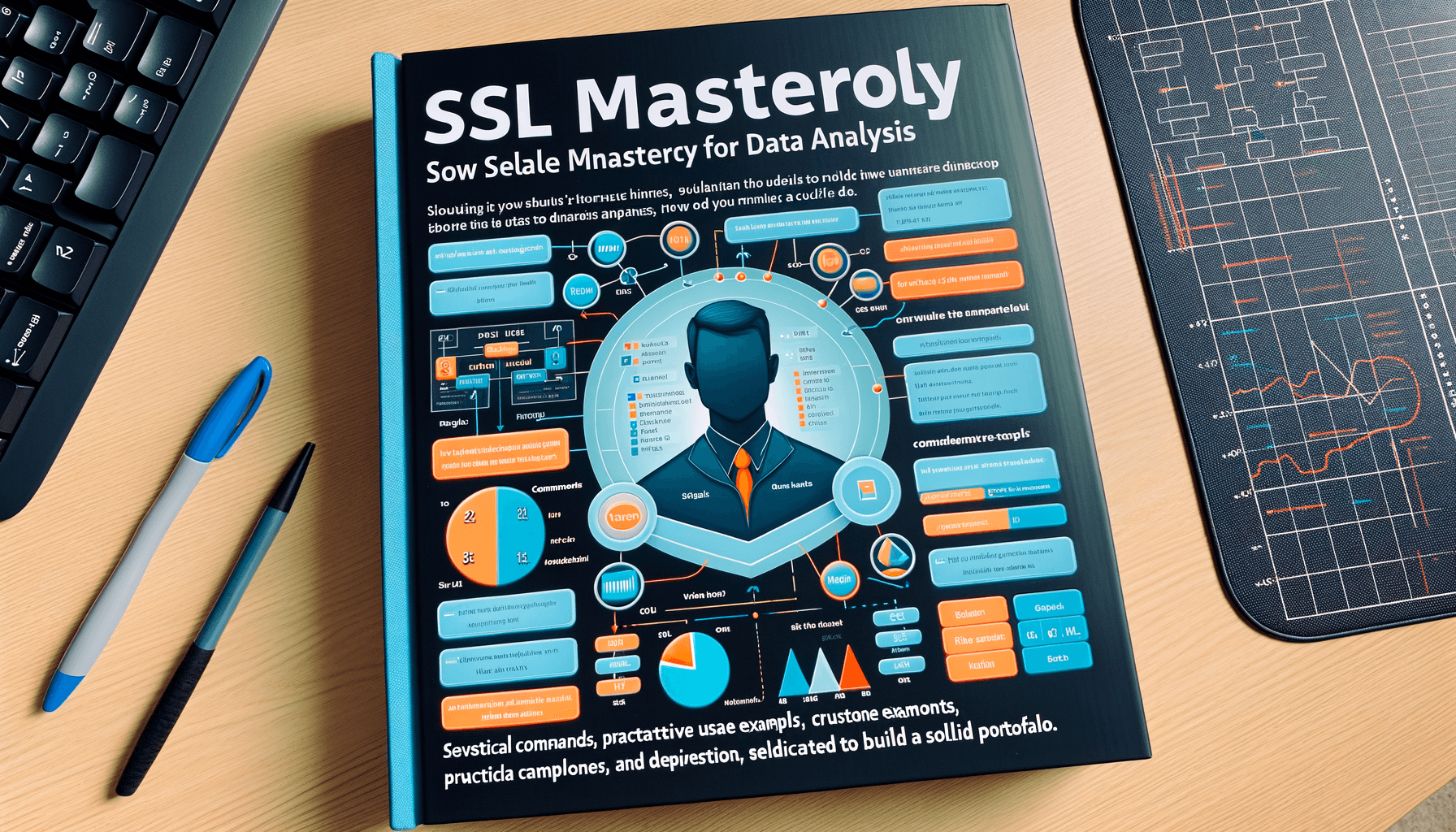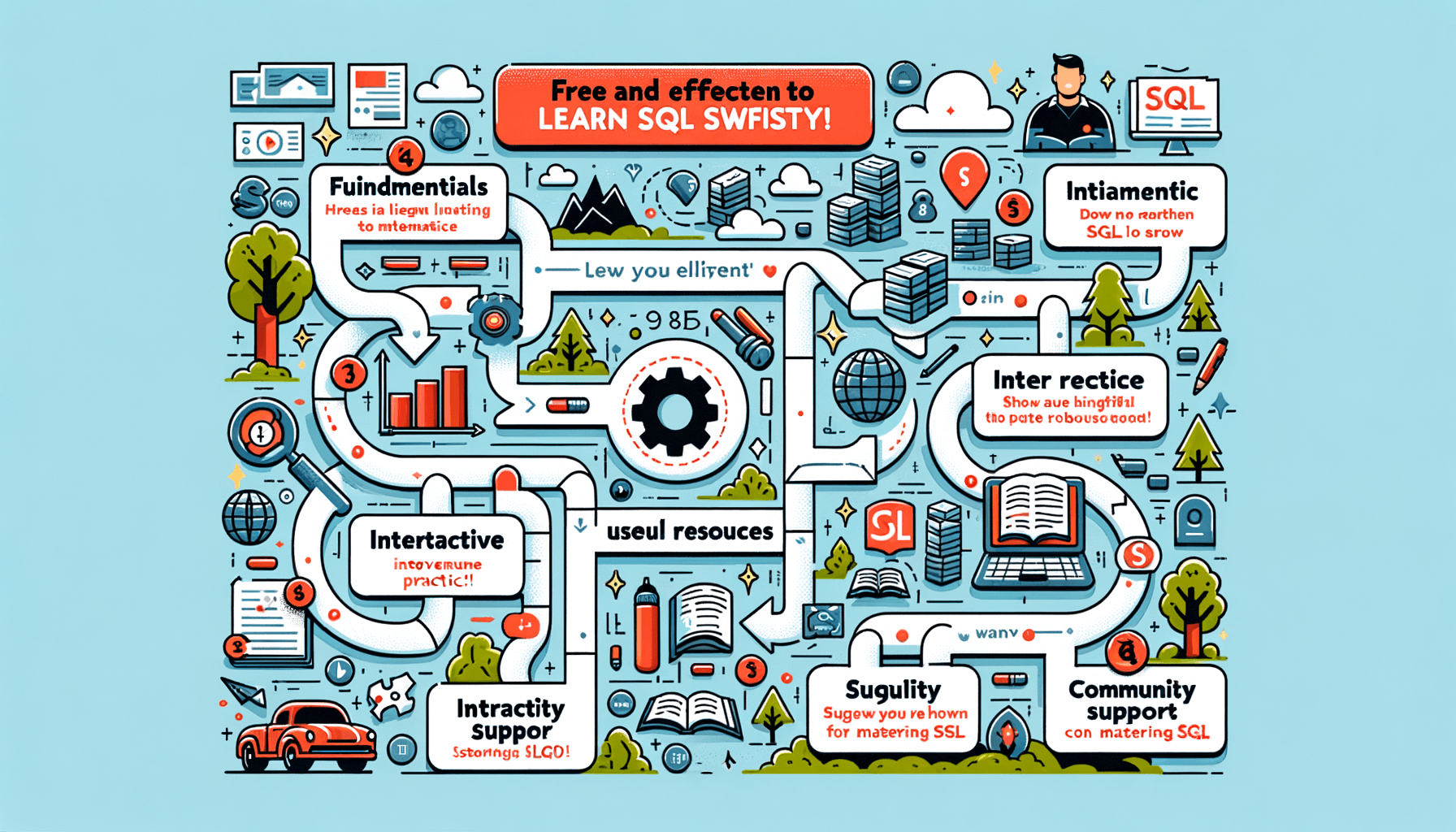A big variety of articles and resources

10 Effective Tips on How to Learn SQL Online
 Sia Author and Instructor
Learn SQL
Sia Author and Instructor
Learn SQL
9 minute read
1. Understand What SQL Does
SQL, or Structured Query Language, is a powerful tool used to communicate with databases. By learning SQL, you can manage and manipulate data efficiently. Here's a basic workflow to help you grasp the essentials of SQL:
- Identify the question you need to answer with the data.
- Determine the structure of the data that will best answer your question.
- Write a SQL query to transform data from database tables to meet your needs.
SQL is not just about writing queries; it's about understanding how data is interconnected and how to retrieve it in the most effective way. By mastering SQL, you can access and analyze data that is critical for making informed decisions in today's data-driven world.
2. Choose A Decent Online Course
Choosing the right online course is crucial for effectively learning SQL. Online courses offer flexibility and a variety of learning materials, which makes them an excellent choice for beginners and experienced learners alike. Ensure you select a course that matches your learning style and goals.
Benefits of Online Courses
- Cost-effective: Many courses are free or low-cost.
- Flexible scheduling: Learn at your own pace and on your own schedule.
- Access to updated materials: Courses often update their content to reflect the latest industry standards.
It's important to review the course structure and the credentials of the instructors to ensure high-quality education.
When selecting an online course, consider its reputation, the comprehensiveness of the course content, and the support provided by the platform. This will help you maximize your learning experience and gain the most from your SQL education journey.
3. Familiarize Yourself With A Reference Guide
Once you have enrolled in your online course, it's time to delve deeper into learning SQL. As you progress, you'll encounter new concepts and syntax. When this happens, it's crucial to have a reference guide at your disposal. A good SQL reference guide not only clarifies doubts but also enriches your understanding of the language.
Reference guides like BitDegree Learn SQL or DataCamp Cheat Sheets are invaluable. They provide clear, concise explanations suitable for beginners and advanced users alike. Start with the basics and gradually explore more complex topics. The more you refer to these guides, the better you'll become at understanding and applying SQL in practical scenarios.
Remember, consistent practice with the help of a reference guide can significantly enhance your SQL skills.
4. Always Follow Best Practices
It is essential to make sure that you are always following industry best practices when you work with any programming language. SQL is no different, and ensuring that you always do things the right way will help keep you out of trouble in the future. Make sure that you're always taking your time and following best practices when you're coding. Don't get lazy, or you may find yourself developing bad habits that could harm your coding career.
However, getting lazy and writing poor quality code is possibly the worst thing you can do as a learning programmer. To learn SQL code without following best practices is a recipe for disaster. You will pick up bad habits, you might start taking shortcuts, and you will find that this will impact your ability to write high-quality code in the future.
5. Connect With Your Peers
Connecting with peers who are also learning SQL can significantly enhance your learning experience. One effective way to do this is by joining online forums and chat boards. These platforms allow you to ask questions about problems you're stuck on and use your knowledge to help others. Sites like the Microsoft Developer Network, Reddit, and various SQL forums are excellent places to start. Additionally, participating in local SQL groups through Facebook or Meetup.com can provide opportunities to meet and network with fellow enthusiasts in person.
Engaging with a community not only helps in solving technical problems but also in building a network that can be beneficial for professional growth and finding job opportunities.
Another great resource is SQLZoo, where you can link your SQL queries and receive feedback from other users. This interactive approach can be particularly helpful when you're trying to work through complex issues. Remember, the more you interact and collaborate with others, the more you'll learn and grow as an SQL developer.
6. Study SQL Error Codes And What They Mean
One of the most important skills when working with SQL is the ability to understand and interpret error messages. Troubleshooting and refining your code is crucial, and knowing what different error codes signify can help you quickly identify and resolve issues. Although many courses may not cover SQL error codes extensively, it's vital to invest time in learning them.
Familiarize yourself with resources like the IBM Knowledge Center, which offers a comprehensive list of common SQL errors and their causes. Bookmark this page and use it as a reference to troubleshoot your code effectively.
By understanding the nuances of error messages, you can enhance your debugging skills and improve your overall coding efficiency.
7. Understand The Different Database Systems
Before you can excel as a SQL developer or database administrator, it's crucial to understand the different database systems available and their specific functionalities. Each system has its own set of features, making it suitable for various types of applications. Here are some of the most popular database systems:
- Microsoft SQL Server
- MySQL
- Oracle
- IBM DB2
Familiarizing yourself with these systems will not only enhance your technical skills but also make you more versatile and employable in the field of database management. It's important to recognize that while all these systems use SQL, the way they implement certain features can vary significantly. This knowledge is essential for effectively designing, querying, and managing databases across different platforms.
8. Practice By Hacking Someone Else's Code
At this stage in your SQL learning journey, hacking someone else's code can be incredibly beneficial. This practice allows you to see different coding styles and approaches, which can enhance your understanding and problem-solving skills in SQL. Here are some steps to effectively learn by hacking code:
- Find a repository: Look for code repositories online that are open for educational purposes. Websites like GitHub offer a plethora of projects where you can study and modify the code.
- Understand the code: Before making any changes, spend time understanding the code's structure and logic. This will help you learn the intent behind certain SQL queries.
- Make modifications: Try to modify the code to either improve its efficiency or adapt it to solve a different problem. This hands-on approach helps solidify your SQL skills.
- Seek feedback: After making changes, seek feedback from peers or mentors. This step is crucial for learning from your mistakes and improving.
By immersing yourself in the practical aspects of SQL through real-world code, you can accelerate your learning and gain a deeper appreciation for the language's capabilities.
9. Practice With Coding Challenges
Practicing with coding challenges is an excellent way to enhance your SQL skills. Websites like HackerRank provide a variety of challenges that cater to different skill levels and focus areas. These challenges often come with clear instructions and goals, making it easier to focus on improving specific aspects of your SQL knowledge.
Benefits of Coding Challenges
- Immediate feedback on your solutions helps you learn and adjust quickly.
- Exposure to a wide range of problems increases your adaptability and problem-solving skills.
- Competitions offer a chance to measure your skills against others, adding a fun and competitive element to learning.
How to Get Started
- Choose a platform that offers SQL challenges, such as HackerRank.
- Start with challenges that match your current skill level and gradually increase the difficulty.
- Make use of the platform’s resources, like forums or solution discussions, to enhance your learning.
Emphasizing practice through coding challenges not only sharpens your SQL skills but also prepares you for real-world scenarios where problem-solving and efficiency are crucial.
10. Download A Code Editor
While starting with SQL, you might find that the built-in editors in database systems suffice. However, as you progress, downloading a dedicated SQL code editor can significantly enhance your coding efficiency and flexibility. A popular choice among developers is DBeaver, an open-source, multi-system database tool. It supports all major database systems and allows for customization to fit your specific needs.
Familiarizing yourself with a robust code editor early on can streamline your SQL learning process and provide a more integrated development environment.
Remember, setting up the right environment is crucial for effective learning and practice. Tools like Coding Ground offer a ready-to-use online coding environment, eliminating the setup hassle and letting you focus on honing your SQL skills.
Conclusion
As we've explored throughout this article, learning SQL online can be a highly effective way to enhance your data manipulation skills. The journey from a beginner to a proficient SQL user involves understanding the core functions of SQL, choosing the right resources, and engaging in consistent practice. Remember, the key to mastering SQL is not just about absorbing information but also about applying it in real-world scenarios. By following the 10 effective tips outlined, you can streamline your learning process and make significant strides in your SQL proficiency. Keep practicing, stay curious, and don't hesitate to explore various tools and communities online to bolster your learning experience.
Frequently Asked Questions
What is SQL and what does it do?
SQL (Structured Query Language) is a programming language designed for managing and manipulating relational databases. It allows you to create, read, update, and delete database records.
How long does it take to learn SQL?
The time it takes to learn SQL can vary based on prior experience and the complexity of the concepts. Generally, basic SQL can be learned in a few weeks, but mastering it might take months or longer.
Are online SQL courses effective for beginners?
Yes, online SQL courses are highly effective for beginners as they often provide structured learning paths, practical exercises, and community support to help understand and apply SQL concepts effectively.
What are SQL best practices?
SQL best practices include using clear and concise queries, normalizing data, using proper indexing, avoiding redundant data, and ensuring data integrity and security.
Can I practice SQL by modifying existing code?
Yes, modifying or 'hacking' existing SQL code is a great way to learn. It helps you understand different coding styles and solutions, and improve your problem-solving skills.
What tools are needed to practice SQL?
To practice SQL, you will need access to a SQL database and a code editor. Tools like SQL Server, MySQL, PostgreSQL, and code editors like VSCode or Sublime are commonly used.
Related Articles

A Comprehensive Guide to Learn SQL for Analysts
8 minute read

Beginner's Guide: Learn SQL from Scratch
8 minute read


